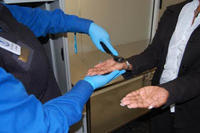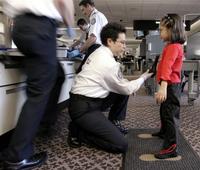-
Animal kingdom's alternatives to full-body scanners
A typical full-body scanner costs upward of $150,000, and critics maintain that for this high price-tag we get a detection system which is not fool-proof and which may be risky for our health; they point out that experience in IED diction in Iraq and Afghanistan shows that dogs are superior to scanners in detecting explosives — and that they are much cheaper ($8,500 for a dog plus training) and do not pose any health risk; some researchers say that mice and bees are even better bomb sniffers than dogs
-
-
Mica says TSA needs more independence from DHS
According to Representative John Mica (R-Florida), the Transportation Security Administration (TSA) needs more independence from DHS so that it may operate more efficiently; in an interview with Bloomberg, Mica, the chairman of the House Transportation committee said, TSA should be given “the authority to whack and hack some of the bad out”
-
-
ASIS Conference: Securing the global supply chain
At the upcoming annual ASIS International security conference, attendees will have the opportunity to learn more about protecting the global supply chain at one of the many educational sessions; officials fear that a terrorist attack on a seaport could cripple a local economy and have global repercussions. As nearly 90 percent of the world’s goods are still shipped via containers on massive transport ships
-
-
Mica cuts 40 percent from House transportation spending
Last Thursday, Representative John Mica (R-Florida) unveiled the House Transportation Reauthorization bill which would allocate $230 billion to infrastructure projects over the next six years; the bill has generated fierce criticism as it would cut transportation spending for America’s roadways by nearly 40 percent
-
-
TSA could begin searching for explosives hidden inside you

Government intelligence officials are now warning airlines that terrorists could be using surgically implanted explosives to bypass security measures; there is no information regarding a specific plot or threat, but airlines could begin to implement additional screening procedures as the current body scanners cannot effectively detect bombs hidden inside an individual; last year, al Qaeda operatives in Iraq implanted two dogs with explosives, but the dogs died before they could loaded onto a U.S.-bound plane
-
-
Lapses in airport security spark concern

Representative Pete King (R-New York), the House Homeland Security Committee chair, is blasting the Transportation Security Administration (TSA) for two recent lapses in screening procedures at airports; a Nigerian man flew across the country using an expired boarding pass without TSA agents noticing; in a separate incident, a passenger boarded a flight without having their boarding pass checked; Senator Charles Schumer (D-New York) is pushing for TSA to adopt technology that would allow security officials to scan ID documents to minimize fraud
-
-
Stopping terrorists from using fake IDs at airports

Steve Williams, the CEO of Intellicheck Mobilisa, a technology company that develops wireless identity systems, was recently interviewed by Homeland Security NewsWire’s executive editor Eugene Chow; Williams discusses the ease with which criminals and terrorists use false documents to travel, how pervasive the problem is, and solutions to help stop it
-
-
New airport scanner can detect liquid explosives
Passengers boarding airplanes could soon be walking through security checkpoints carrying liquids once more thanks to a high tech scanner capable of detecting liquid explosives; the device, developed by U.K. based Kromek, is capable of identifying dangerous liquids within seconds and does not require the container to be opened
-
-
FAA studies general aviation airports

There are 368 primary airports in the United States — and 2,950 nonprimary, or general aviation, airports; the FAA is now studying the roles and functions of these general aviation airports; general aviation airports provide a variety of functions, ranging from access for emergency medical services, disaster relief, aerial firefighting, law enforcement, and border control to agricultural functions, flight training, charter passenger and time-sensitive air cargo services, among others
-
-
Bomb-proof bag for planes' luggage compartment developed

The blast-absorbing bag, named the Fly-Bag, features multiple layers of novel fabrics, composites, and coatings and is designed to be filled with passenger luggage and then placed in the hold of a plane; if one of the pieces of luggage inside the Fly-Bag had a bomb in it and the bomb exploded during the flight, the resulting blast would be absorbed by the bag owing to its complex fabric structure, preventing damage to the plane; fundamental to the design of the bag is the internal elastomeric coating and impregnation of fabric with Shear Thickening Fluids (STF); STFs work by increasing in viscosity in response to impact
-
-
Documents reveal TSA ignored dangers of body scanners
The Electronic Privacy Information Center (EPIC) says that is has official documents that reveal the Transportation Security Administration (TSA) deliberately ignored warnings that airport body scanners pose a health risk; the internal documents and email exchanges show that TSA officials brushed aside concerns that employees raised after noticing that a large number of workers had cancer, strokes, and heart disease after working near the body scanners
-
-
RAILENIUM awarded 550 million Euro boost from French government
RAILENIUM, the European Institute for Technological Research in Rail Infrastructure, has been selected by the French government as a leading investment project and has been awarded 550 million Euros in funding; the equipment and research platforms that RAILENIUM will provide will be unique in Europe; this will include a 5 km rail test loop, a tramway test track, a fatigue-simulation track, running trial facilities, and service structures
-
-
Elderly woman forced to fly without adult diaper
A 95-year old woman dying of leukemia was planning on flying from Florida to her native Michigan so she could spend the last months of her life closer to her family cemetery plot; she was subjected to a 45-minute security examination at a Florida airport; two female agents discovered that the wheel-chair bound woman was wearing a Depend adult diaper, and insisted that unless the diaper was removed, the woman would not be allowed to fly
-
-
U.S. no longer mandating 100 percent screening of cargo containers

DHS Secretary Janet Napolitano announced that the United States is no longer going to screen every cargo container before it enters the United States; she said, “We believe the so-called 100 percent requirement is probably not the best way to go”; in 2007 Congress mandated that all containers entering the United States must be scanned at their ports of exit by 2012; the 2007 bill empowers DHS to extend the 2012 deadline if the agency believed that the goal was not achievable and in the past Napolitano has expressed doubts about the feasibility of screening 100 percent of the cargo entering the United States
-
-
TSA hopes to limit child patdowns

On Wednesday the head of Transportation security Administration (TSA) said the agency was working to make security screening procedures less intrusive for small children; airport screeners will be instructed to make repeated attempts to screen children using electronic methods; the agency hopes that this will limit, but not eliminate, the number of children receiving pat downs
-
More headlines
The long view
Calls Grow for U.S. to Counter Chinese Control, Influence in Western Ports
Experts say Washington should consider buying back some ports, offer incentives to allies to decouple from China.
